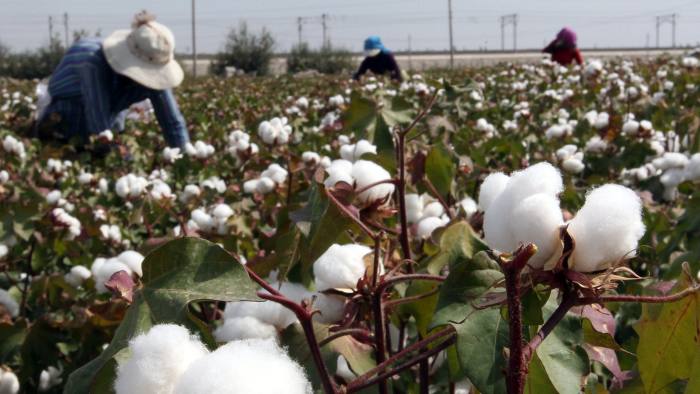China’s Bingtuan paramilitary force tightens grip on Xinjiang

Financial Times, 22 May 2018
 By Emily Feng – In Hotan county, in the south-west of China’s remote Xinjiang region, where once there was only barren desert, rows of trees have taken root, bearing red dates and pomegranates.
By Emily Feng – In Hotan county, in the south-west of China’s remote Xinjiang region, where once there was only barren desert, rows of trees have taken root, bearing red dates and pomegranates.
The agricultural project is one of the latest in a decades-long programme of land reclamation efforts in Xinjiang that cost $4bn last year alone, according to Bingtuan, a 3m-strong paramilitary force that is creating the new farmland areas.
“[Before] there was nothing here, not even the date fields,” said Xing Jiewang, a Han (ethnic Chinese) construction worker.
The project is the latest evidence of Bingtuan’s tightening grip on this vast region’s economy and — some fear — driving out the local Uighurs, who are from a Muslim Turkic ethnic group.
Since the annexation of Xinjiang in 1950, Beijing has had a troubled relationship with the Uighurs. The region has seen sporadic outbreaks of ethnic violence. In 2016, fears of domestic terrorism prompted China to dramatically increase surveillance of the Uighurs. Last year an Isis video surfaced of Uighur fighters in Iraq calling for attacks in China.
The Xinjiang Production and Construction Corps, Bingtuan’s official name, has been playing an increasingly important role in security as well as economic development in Xinjiang over the past few years, according to James Leibold, an associate professor at Melbourne’s La Trobe University who studies the region.
Set up under the orders of Mao Zedong in 1954 to colonise border areas with demobilised soldiers, Bingtuan (the name means army corps in Mandarin) runs everything from agriculture and artillery forces to newspapers and television stations across Xinjiang.
It has become a large agribusiness producing goods such as cotton and tomato ketchup, often for export. It owns dozens of companies, some publicly traded, such as Chalkis, a Shenzhen-listed company that grows tomatoes and exported 90 per cent of its produce last year, according to its annual report.
The total value of Bingtuan’s output from Xinjiang has jumped from $23.5bn in 2013 to $36.7bn in 2017 when it exported $6.63bn worth of goods.
Bingtuan personnel include administrative workers and civil servants. Others are trained soldiers and digital surveillance workers who play a key role in the security systems that keep Xinjiang under lockdown.
Recommended Chinese politics & policy Security spending ramped up in China’s restive Xinjiang region Its massive agricultural projects in Xinjiang’s arid deserts require thousands of workers, who are almost always Han, the dominant ethnic group in China, that Bingtuan has helped to relocate to the area.
“Land reclamation and infrastructure projects that support reclamation, particularly Bingtuan projects, have led to increased Han settlement of traditional Uighur areas,” said Darren Byler, an anthropologist at the University of Washington who specialises in Xinjiang.
Although Uighur labourers are employed to help harvest seasonal crops, Uighurs tend to not own the businesses or get a share of the profits. Mr Byler said “many Uighurs see land reclamation as a way of pulling them into [insecure] wage labour as contract workers”. Uighur farmers historically have owned their own land, but it is hard to compete with the large farms set up by Bingtuan, which often divert water away from traditional farming areas.
In Hotan district, where two of the newest Bingtuan regiments are based, the militia has reclaimed 510,000 hectares of land. The area is now home to more than 47,000 people. Last year, it was reclassified as a full-blown city and renamed Kunyu. It has its own hospital, school and private airport.
Nearly all of the settlers on the newly reclaimed land are Han. They hail from the populous but poor provinces of Henan and Sichuan and many arrived after being targeted by recruiters with stories of easy riches and patriotic service.
“The government is flattening the desert to attract more Han people,” said Ge Liang, a Han settler from Sichuan. “What Uighur would come out here?”
Uighurs continue to live in their original towns and settlements in well established agricultural areas, but Han Chinese have been moving to those too. In traditional Uighur centres such as Hotan City, Han have taken up residence in the wealthiest areas and their presence has already changed the traditional rhythm of urban life, which used to be dictated by Uighur culture.
At the city’s largest night market, once dominated by Uighur cuisine, the majority of vendors are now Han, selling snacks from outside the region such as Zhejiang seafood and Sichuan hotpot.
Uighurs are also treated differently to Han Chinese at the numerous roadblocks throughout Xinjiang where police wave Han through but do random spot checks on Uighurs.
Uighur tradesmen cite Han migration as the cause of inflationary living costs. “Of course this will have an effect on our culture and economy,” Khainat, a Hotan carpet seller, said of the influx. “There are lots of Uighurs here, however. We are not afraid.”
Reported by Emily Feng for the Financial Times
https://www.ft.com/content/60fbc746-1d34-11e8-956a-43db76e69936

